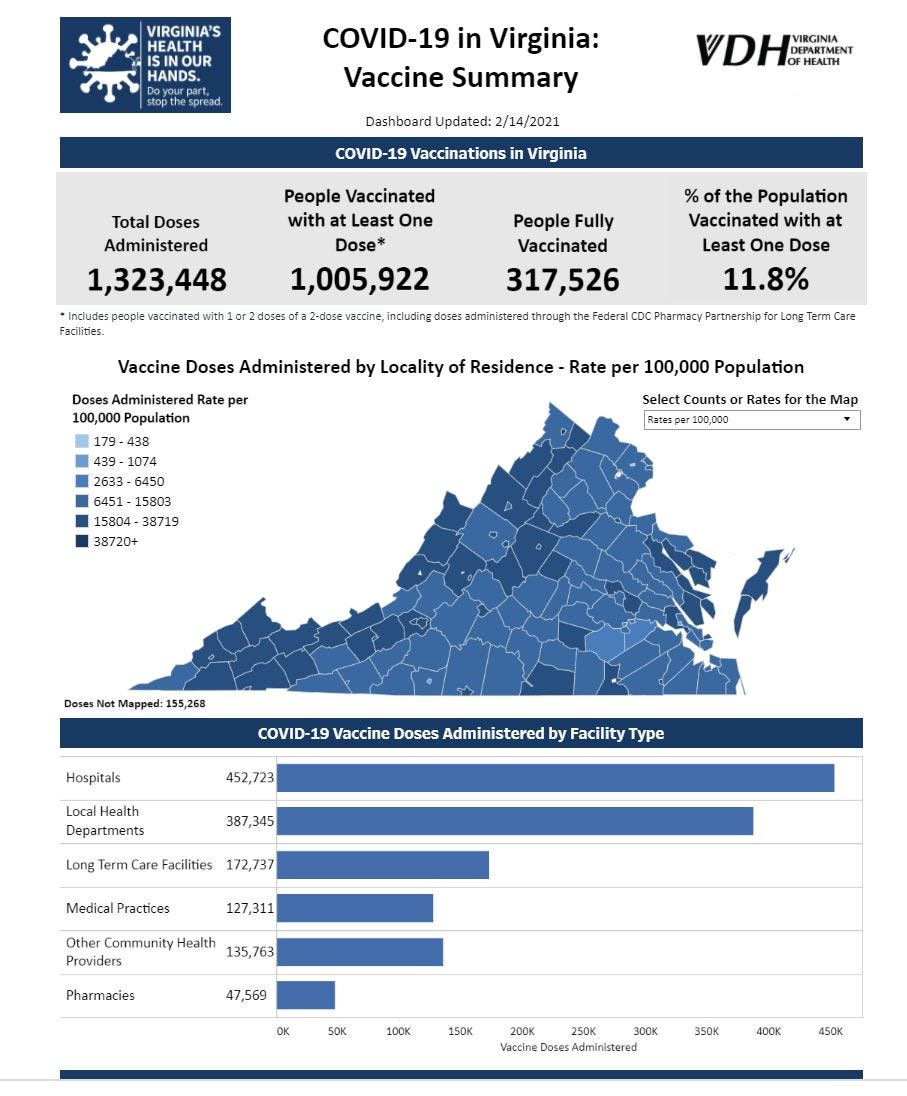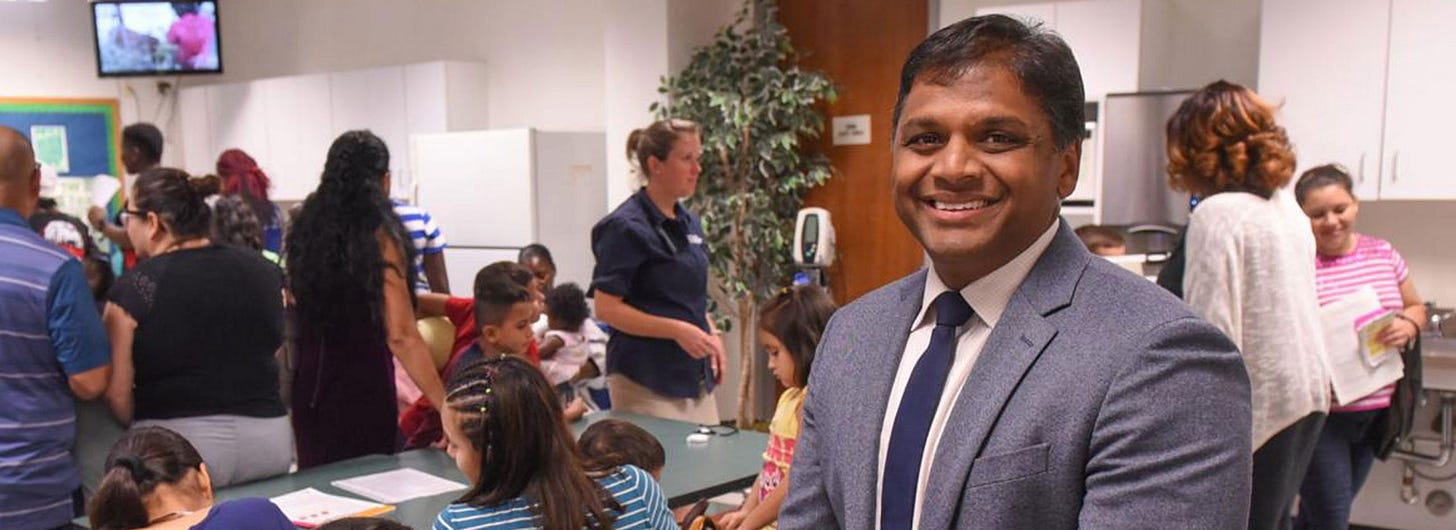Perhaps we sing about the weather outside being frightful at the wrong holiday, but this winter certainly has transformed the greater Charlottesville area into a bit of a wonderland. Fitting for Valentine’s Day! Charlottesville Community Engagement is here for February 14, 2021 to bring you another installment on the pandemic.
Today’s program is a gift from me to you for Valentine’s Day. I’ve dedicated my life to doing this work in order to help this community understand itself a little better, and I’m grateful to the universe for allowing me to be here at this time. My message here today is simply a hope today that this message finds you well. If not, then it’s a wish for a better tomorrow.
On today’s show:
More on the vaccination roll-out including a concern CVS is not distributing through an equity lens
Lessons learned at UVA Health during the pandemic

Another newsletter, another set of pandemic numbers. All long-term indicators of community spread continue to trend downward at the state level. The seven-day average of positive PCR tests is now at 9.6 percent, down from 15.5 percent a month ago. Today the seven-day average for new cases dropped below 3,000 a day for the first time in over two months. However, one trend is for an increased number of cases in Charlottesville, with an average of 34 a day, with other indicators increasing.
But there is now evidence that new strains of COVID are here, throwing another uncertainty into the situation.
On Friday, the Virginia Department of Health announced that a person in eastern Virginia contracted what is known as the U.K. variant of the SARS-CoV-2 virus. They also identified the first case of what is known as the South African variant.
“A preliminary report from experts in the United Kingdom indicates that this variant causes more severe illness than other variants, but more studies are needed to confirm this finding,” reads the press release that went out Friday afternoon.
With the pandemic now at the 11 month mark, what does this mean for the pathway forward?
Dr. Danny Avula talked about the variants on a press call Friday afternoon held in his capacity as the vaccine coordinator for the Virginia Department of Health.
“We’re certainly paying close attention to the variant situation and I think the entire country and the entire world are in similar boats in the way that we approach this,” Dr. Avula said. “We don’t know what’s to come. We know right now that we in Virginia we’ve got evidence of both the B.1.1.7 and the B.1.3.5.1, the U.K. and the South African variants. We also know that these have presented a really significant issue in other countries.”
Avula said he spoke with colleagues from Israel last week who told him that the U.K. variant is now the dominant strain.
“Within two months of identifying the B.1.1.7 variant, it became their dominant strain and they were reporting last week anywhere from 70 to 80 percent of their new infections were the U.K. strain,” Avula said. “Our modelers down at the CDC say it will be the dominant strain here in the United States by the end of March.”
Dr. Avula said the vaccines still appear to be effective against the U.K. strain but more data is necessary to determine its efficacy against the South African strain. In the meantime, he encourages people to continue to be vigilant.
“I think what it does mean for Virginia is that we have to double down on all the core mitigation strategies like the masking and the distancing,” Dr. Avula said.
Dr. Avula said that means improving the vaccination system. We’ll hear more from him on that later.
Let’s now check in with the University of Virginia Health System. They also held a press briefing on Friday. Dr. Costi Sifri is an infectious disease expert.
“Variants are in the United States, they’re in Virginia,” Dr. Sifri said. “We don’t know exactly how many because we have not done a lot of genomic sequencing to understand how many there are and where they are located.”
Dr. Sifri said that will likely change over time and the public should be prepared.
“We would anticipate that we will see them in increasing amounts and as we know the CDC has predicted that is what we can anticipate seeing in the upcoming months,” Dr. Sifri said. “What we understand however from what’s occurred in Europe is that COVID precautions so what we really need to do is double down and be committed to continuing the things we know prevent the transmission of COVID.”
That means washing hands, keeping distance, and continuing to wear a mask.
Also on the briefing call was Kyle Enfield is the director of the Special Pathogens Unit at the University of Virginia Health System. He’s been on the frontline of the fight against the virus since the pandemic began.
“A lot has happened in the time that we’ve had COVID patients at UVA,” Enfield said. “We admitted our first patient on March 23, 2020. We have learned a lot about how to care for these patients at UVA.”
Part of that has come from clinical trials to get treatments and part is the experience that comes with dealing with patients dealing with a novel virus over months. Dr. Enfield shared one lesson learned.
“We don’t rush to intubate patients as early,” Enfield said. “What we have found is that there is a group of patients that while they require very high levels of oxygen, or what we call high-flow oxygen, many of them will do very well without intubation and the benefit to the patient is that by not being put on a breathing machine they are able to be more interactive with us as a team, more interactive with their environment. They don’t require the sedative medications that can lead to a complication called delirium in the ICU.”
Another lesson is the use of remdesivir in patients who aren’t seriously ill as well as use of certain steroids.
In the early days of the pandemic, one of the concerns was whether there were enough ventilators to go round. Dr. Enfield said the state helped manage an inventory.
“We actually have a good strategic surplus in the state of Virginia that allows us to move ventilators from hospital to hospital and we haven’t really had to touch that at all,” Enfield said.
Now the state is working to manage a limited number of vaccines from the federal government, while also dealing with the federal program that allocates other doses to pharmacy chain CVS.
Dr. Sifri said the University of Virginia Health system has remained busy assisting the Blue Ridge Health District with vaccinations.
“Our biggest challenge is that we’re constrained by the supply of vaccine,” Dr. Sifri said.
As of this morning, more than one million Virginians have received at least one dose of a vaccine according to the Virginia Department of Health dashboard. The seven-day average is now at 35,873 a day. The target set by Governor Ralph Northam is 50,000 a day.

Dr. Avula said the number of doses will increase, but the pathway isn’t entirely clear.
“The rest of it really depends on how the production goes with Moderna and Pfizer, and then the timeline for the introduction of Johnson & Johnson, and Astra-Zeneca, and then the potential for Novovax down the road,” Avula said. “Johnson & Johnson has submitted their application for authorization. That decision is due to be made on February 26 and so our hope is that in the first week of March that brings new vaccine into the supply line and the Moderna and Pfizer production will just continuously increase over the course of the next couple of months.”
Next week, the VDH will roll out a centralized system for people to register vaccinations. Dr. Avula acknowledged that the opening up of Phase1B overwhelmed local health departments across Virginia.
“What we have done in response to that is create this more centralized process and it allows us to have consistency to follow the guidelines that we’re crafting at the state level, but there still has to be local flexibility, right?”
Dr. Avula said different areas of Virginia may have different needs. For instance, efforts are afoot on the Eastern shore to vaccinate workers in poultry factories.
To confuse matters more, Fairfax County will be opting out of the statewide registration system. Dr. Avula spoke with officials there on Friday.
“I think the county worked really hard to build their own registration process and for reasons you’d have to ask them about, they weren’t ready to make that transition,” Dr. Avula said. “We absolutely encouraged it. The Fairfax County Health Department is not under the jurisdiction of the state. They are one the ones that are independent and integrated into their local government.”
So far, many people have been able to get appointments outside of local health districts through vaccinations at CVS pharmacies, for which doses are being allotted through a different system. Dr. Avula said he has an issue with their process for favoring those with means.
“It does not allow equitable access, right?” Dr. Avula said. “It does not take into consideration people who don’t have Internet access, or who don’t have the ability to wake up at 5 a.m. and try to sign up…. It favors those those can be mobile, right? So you have people in parts of Northern Virginia who are willing to drive to Abingdon to get an appointment. We need to figure something out there.”
Avula gave details about how the VDH system will look when it is formally announced later this week. It’s not just an Internet portal and the goal is to expand access.
“What will be coming next week is a central call center with 750 call takers,” Avula said. “They will be in English and in Spanish. They will also have access to a third-party translation service in a hundred different languages.”
The announcement is expected later this week.
Thanks for reading! You can help support this work which is produced under the name Town Crier Productions in order to make a living as I go about my work researching public policy in our community.
Support my research by making a monthly donation through Patreon
Sign for a subscription to Charlottesville Community Engagement, free or paid
Send a check to Town Crier Productions















Share this post